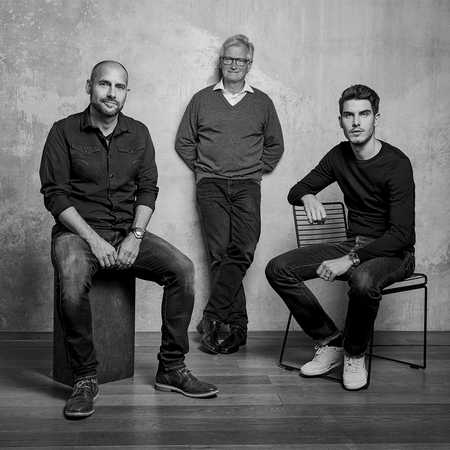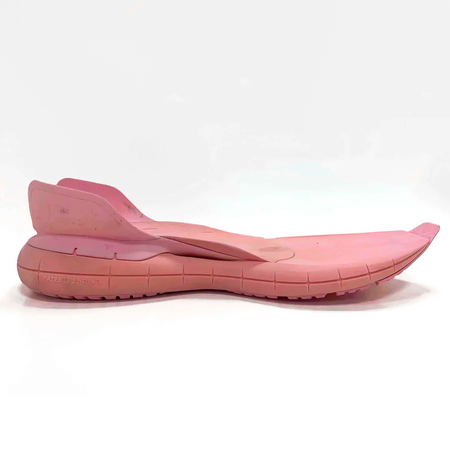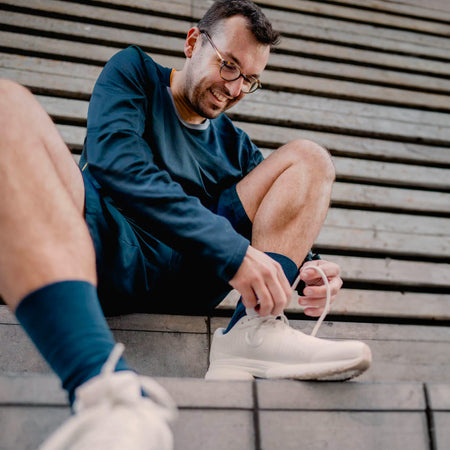TRIATHLETE AND TRAUMA SURGEON:
"EVERY DAY IS A SURPRISE"
For hours, Daniela Wiefhoff runs through the halls and corridors of Johanna-Etienne Hospital in Neuss. The 28-year-old is a resident physician specializing in orthopedics and trauma surgery. "I just function while I'm at work," she says. What matters most to her are her patients. Her own needs? They take a back seat. This is a portrait of a doctor who manages the high workload and mental stress through triathlon training sessions.
Daniela Wiefhoff's smartwatch keeps counting. And counting. And counting. For hours. Almost every day. "At least 10,000 steps per shift," says the resident physician at Johanna-Etienne Hospital in Neuss, North Rhine-Westphalia, as she taps on the electronic watch on her wrist. Today could be another one of those days where anything can happen. "Every shift, every day is a surprise," says the 28-year-old.
As an orthopedic and trauma surgeon, no day is like any other. Fixed breaks? They don't exist—at least not when Daniela is assigned to the emergency room. "I couldn't imagine the workload being so extreme before," Daniela recounts. She works 44 hours a week. At least. If she's on call, it often becomes significantly more.
Finding a moment of calm is impossible in such situations.
During her shift, Daniela rarely sits down. Instead, she rushes from examination room to examination room. Behind her, the metal sliding doors close in the white-tiled hallway. The phones of the attending physicians ring. "I just function while I'm at work," explains the 28-year-old trauma surgeon. "It's incredible how long a person can keep going without taking care of themselves." Daniela hasn't had a drink today.
She opens the door to a treatment room; the patient is lying on the examination table. Daniela introduces herself. "A day in the emergency department can be relaxed," she says. However, it can also quickly turn into the exact opposite. Simple back pain—or falls from a ladder while changing a lightbulb, cuts from kitchen knives, car accidents: "When things get hectic, they really do," she says.
PUSHING ONE'S OWN LIMITS
Becoming a doctor has a lot to do with Daniela's hobby, the 28-year-old explains: "I was a long-distance runner for a long time." She repeatedly faced injuries throughout her athletic career. Daniela realized that she wanted to do something where she could bring some good to others in their most difficult moments.
"As a doctor, I can help people and feel like I'm giving something meaningful back to society," she says. The gratitude she receives from her patients is the greatest reward for Daniela. "The humanity we receive in return is simply indescribable."
In doing so, the trauma surgeon pushes herself to her limits every day—and sometimes even beyond. During her constant running through the maze of the emergency department, passing by metal doors and hand sanitizer dispensers, Daniela doesn't realize how exhausted she actually is. "When I'm working, I'm filled with adrenaline," she says.
"It's only when I come home and collapse onto the couch that I slowly start to realize how completely drained my body is." Daniela's feet and legs burn, ache, and throb, while her head pounds. "I walk thousands of steps every day, and in the evenings, I feel how demanding the daily hospital routine is." She mentions that the better her shoes are, the less pain she experiences.
TAKE CARE OF YOURSELF,
WHENEVER YOU NEED IT
"My work shoes are the shoes I wear the most," says orthopedic surgeon Daniela Wiefhoff. Thanks to the patented U-TECH™ technology, the U-TECH White Nevos reduces knee and Achilles tendon stress by up to 10% and helps reduce muscle fatigue. It's perfect for all situations where you spend a lot of time on your feet. Experience the U-TECH White Nevos.
But that alone is not enough.
In order for Daniela to take care of her patients, she must take care of herself as well. If she's not too exhausted and the day hasn't been too long, she exchanges her doctor's coat for her running gear in the evenings. Despite the constant demands at the hospital, the 28-year-old manages to train for about eight hours per week. "The fitness I gain through sports helps me cope with my workload," says Daniela, the ambitious triathlete.
Daniela got into triathlon during the scorching summer of 2018. "It was so hot back then," she recalls, "that there was really nothing else I could do except go swimming." Her partner, a former competitive swimmer, taught Daniela how to swim freestyle. Throughout the entire summer, she would hop on her bike every day and ride to the swimming pool. In 2019, she then completed her first triathlon in Zurich.
When she's on her bike, running through the city, or diving into the swimming pool, Daniela can disconnect and forget about the daily hospital routine and all the stressful experiences. "Especially after a long, intense workday, I need to clear my mind. Sport becomes like therapy for me," explains the 28-year-old.
Even though she is physically exhausted time and time again, Daniela primarily battles with something entirely different: the mental strain. The more difficult and impactful the experiences, the more she feels a sense of emptiness. Training helps her process the day. "It's through sports that I find myself again," she says. And that's important so that she can rush through the hospital corridors the next day once more.














